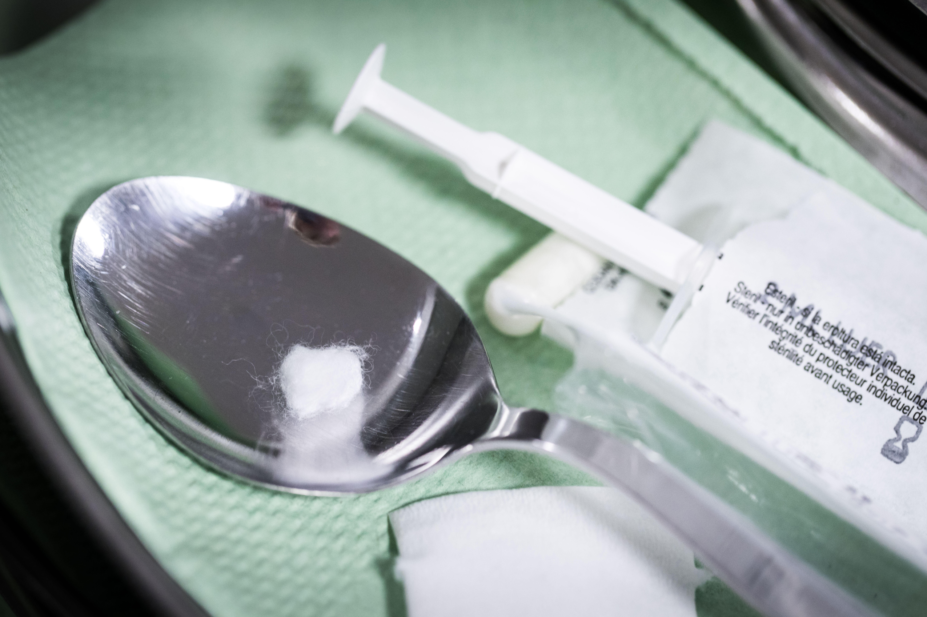
dpa picture alliance / Alamy Stock Photo
Drug consumption rooms should be introduced on a pilot basis in areas of high need, a report from the House of Commons Health and Social Care Committee has said.
The recommendation forms part of a report by MPs who concluded that UK policy on illegal drugs was “failing” and that a “radical change in approach” was needed, moving from the current criminal justice approach to a “health-focused and harm reduction” approach.
As part of this change, the committee called for the responsibility for drugs policy to be transferred from the Home Office to the Department of Health and Social Care.
The report highlights that drug deaths in the UK, and in particular in Scotland, are among the highest in Europe and says that there is currently “an unacceptable gap” between best practice and what services can deliver to people.
A significant investment to improve and extend drug treatment services is therefore needed “as a matter of urgency”, it adds.
Carole Hunter, lead pharmacist in addiction services at NHS Greater Glasgow and Clyde, said the report recognised the scale of the drug problem in the UK.
“Introducing new initiatives, including drug-checking facilities and drug consumption rooms, alongside scaling up existing evidence-based responses … are essential to protect the health of people who use drugs, prevent deaths and protect communities,” she said.
“Glasgow has published a comprehensive evidence-based public health needs assessment that clearly demonstrates the high need for local introduction of drug consumptions rooms.
“The research and evaluation of this pilot would allow evidence to be gathered on the operation and effectiveness of these facilities in the UK context.”
Catriona Matheson, a substance use expert at the University of Stirling, convener of the Drugs Research Network Scotland and chair of Scotland’s Drug Deaths Taskforce, said she was “very supportive” of people using drug consumption rooms, but added that although pilots were important, full implementation was “imperative” to reduce the number of drug deaths.
“The drug task force in Scotland would be supportive of this approach, but unfortunately we are currently unable to provide this — despite a comprehensive proposal made by Greater Glasgow Health and Social Care Partnership in 2017/2018,” she said.
“There is no doubt, from the evidence in other countries, that safe drug consumption rooms would have an impact on reducing drug deaths. Piloting is important to iron out problems, but I would want to move quickly to fuller implementation. If we are to have an immediate impact on our drug death crisis, this is imperative.”
The Health and Social Care report said that “sufficient funding” should also be made available to ensure that heroin-assisted treatment, naloxone and needle and syringe exchanges are accessible to all those who could benefit.
But Roz Gittins, director of pharmacy at the charity Humankind, highlighted how substance misuse services have been subject to significant cuts in recent years.
“To have such approaches as a ‘standard’ offer across all treatment services nationally would, in theory be great, but in the current climate services are struggling to even afford medication for opioid substitution and take-home naloxone. Therefore this report is also right to draw attention to the need for proper, and long overdue, investment in services.”
The report also recommended that the government should consult on the decriminalisation of drug possession for personal use from a criminal offence to a civil matter as “doing so would save lives and provide better protection for communities”.
Sarah Wollaston, the committee chair and a GP, said the recommendations put forward in the report propose changes to drugs policy that were “desperately needed to prevent thousands of deaths”.
“A holistic approach centred on improving the health of and reducing the harm faced by drug users, as well as increasing the treatment available, must be a priority going forward. This approach would not only benefit those who are dependent on drugs, but benefit their wider communities,” she added.
“The government should learn lessons from the international experience, including countries like Portugal and Frankfurt,” she added.
“Decriminalisation alone would not be sufficient. There needs to be a radical upgrade in treatment and holistic care for those who are dependent on drugs and this should begin without delay.”
In 2017, the government rejected recommendations from the Advisory Council on the Misuse of Drugs to consider introducing drug consumptions clinics in areas with a high concentration of injecting drug use, saying that “people using drugs they have bought on the street is not part of a structured treatment plan”.

